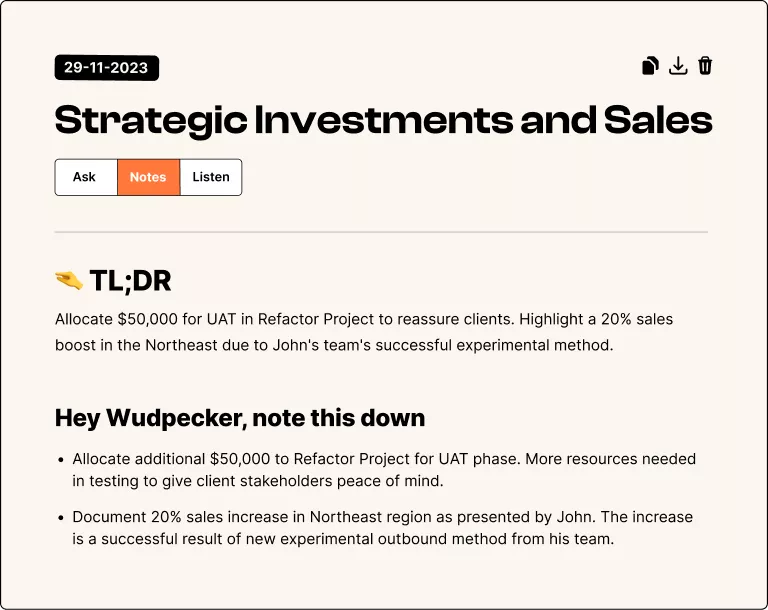Want to learn the best business insights from remarkable speakers at Slush 2023, but don’t have the time to watch the full speeches on YouTube?
You’ve come to the right place. Below is a summary of a speech by Hilmar Veigar Pétursson, CEO of CCP and creator of EVE Online, the most player-driven MMO ever, and Michael Chow, Co-Founder and CEO of Believer, the most-coveted new game studio of 2023.
(psst: the notes were automatically generated with Wudpecker's AI notetaking tool. If you'd like to check these notes + transcript + audio recording without needing to log in, press here.)
<p class="h1-rich">🤏 TL;DR</p>
Venture capital firm Light Speed discussed gaming and AI with gaming legends Hilmar and Michael, who are focused on making next-generation open world games. Players want AI to create big, deep, and rich gaming experiences, but fear it may lead to mediocre games. Startups have an advantage over incumbents in the AI battle due to their ability to build the right people, culture, and workflows. Action items include implementing hands-on curiosity and intellectual pluralism in the company culture, encouraging employees to explore and learn about AI technologies, and focusing on creating novel and unprecedented gaming experiences with AI.
<p class="h1-rich">✨ Summary</p>
Introduction
- Light Speed is a venture capital firm that partners with extraordinary founders, including in the gaming industry.
- They manage $30 billion across 13 global offices and have a growing presence in Europe.
- They are excited to discuss gaming and AI with two gaming legends, Hilmar and Michael.
Hilmar and Michael's Background
- Hilmar is the CEO of CCP, known for the game Evon Line, which is celebrating its 20th anniversary.
- Michael is the CEO of the Believer Company and has worked on games like Words with Friends and League of Legends.
- Their focus is on making next-generation open world games.
Players' Feelings about Generative AI
- Players are passionate about AI in games, as they want big, deep, and rich gaming experiences.
- They believe AI can help create these experiences but also fear that it may lead to mediocre games.
- Players want games that meet their expectations and don't want AI to ruin the experience.
Unprecedented Experiences with AI
- Light Speed believes that companies that build completely novel and previously impossible experiences with AI will succeed in the gaming industry.
- They want to know what magical experiences players will have with the help of AI.
- Hilmar believes that AI can provide ultimate power fantasies for players and make games more personalized to their desires.
Startups vs. Incumbents in the AI Battle
- Michael believes that startups have an advantage in the AI battle because they can start from a clean slate and build the right people, culture, and workflows.
- Incumbent companies may struggle to take full advantage of AI due to existing structures and the wrong people.
- Hilmar believes that both startups and incumbents have opportunities in the AI landscape.
Design Time AI vs. Runtime AI
- Design time AI focuses on creating intelligent NPCs and emergent behaviors, while runtime AI allows for creative control and a tighter grip on the final product.
- Hilmar believes that both design time AI and runtime AI are valid and will continue to improve games.
Culture and Leadership in the AI Landscape
- Michael emphasizes the importance of hands-on curiosity and intellectual pluralism in fostering a successful AI culture.
- Believer mandates that everyone spends 40 hours in something they dislike to understand its potential.
- They also encourage open-mindedness, vulnerability, and respectful debate to create a culture of daring leadership.
Reflecting on Failures as Leaders
- Michael acknowledges that he sometimes falls into a disappointed Asian dad mode, which is not his natural style of leadership.
- He wants to work on being more understanding and supportive of team members who may struggle with adopting new ideas and technologies.
- Hilmar regrets not starting an intern program earlier to cultivate talent and expand the company's footprint.
Conclusion
- Gaming is a people business, and the success of AI in gaming depends on fostering curiosity, embracing new ideas, and creating a supportive culture.



.svg)



.jpg)
















.svg)
